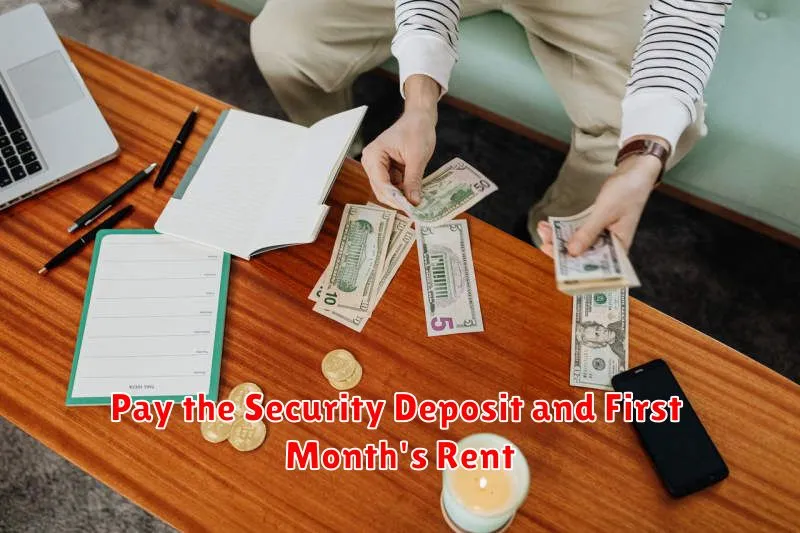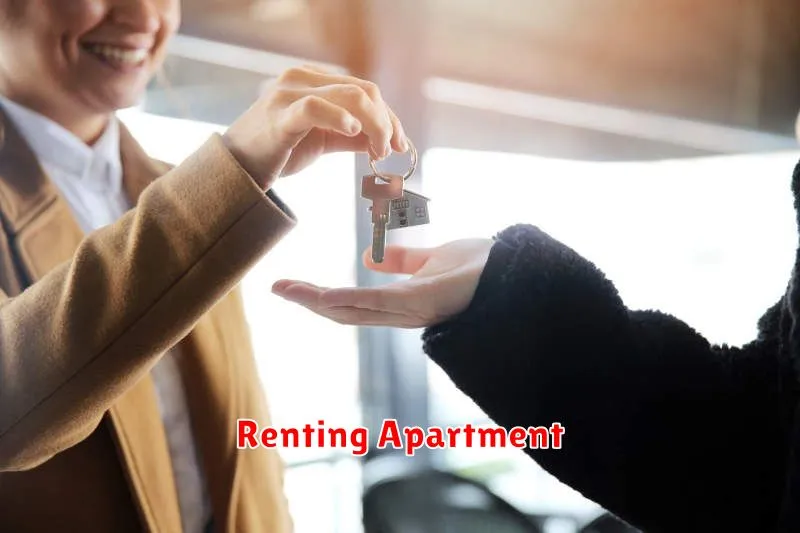Finding the perfect apartment can be a daunting task, but it doesn’t have to be! This ultimate guide to renting an apartment will equip you with the essential information and tips to navigate the process smoothly. From understanding your budget and needs to finding the ideal location and negotiating a lease, we’ll cover everything you need to know to secure your dream apartment. Whether you’re a first-time renter or looking for a new place, this comprehensive guide will walk you through each step of the journey, making the process less overwhelming and more enjoyable. Get ready to embark on your apartment hunting adventure!
Determine Your Budget and Needs
Before you start looking for apartments, it’s essential to determine your budget and your needs. This will help you narrow down your search and avoid wasting time on apartments that don’t fit your criteria.
To determine your budget, consider your monthly income and your expenses. You should aim to spend no more than 30% of your income on rent. If you’re unsure how much you can afford, you can use an online rent calculator to get an estimate.
Once you have an idea of your budget, think about your needs. Consider the following factors:
- Location: Where do you want to live? What kind of neighborhood are you looking for? Do you need to be close to public transportation, schools, or work?
- Size: How many bedrooms and bathrooms do you need? Do you need a lot of space, or are you okay with a smaller apartment?
- Amenities: What amenities are important to you? Do you need a gym, laundry room, or parking? Are there any specific features, like a balcony or a fireplace, that you’re looking for?
Research Different Neighborhoods

Before you start looking at specific apartments, it’s crucial to figure out which neighborhoods you want to live in. This will narrow down your search significantly and ensure you’re only looking at places that fit your lifestyle and budget. Think about what’s important to you in a neighborhood:
- Proximity to work or school: How long are you willing to commute?
- Transportation: Do you need easy access to public transportation, or are you comfortable driving?
- Amenities: Are you looking for a neighborhood with lots of restaurants, bars, shops, and parks? Or do you prefer a quieter, more residential area?
- Safety: Do you want to live in a neighborhood with a low crime rate?
- Cost of living: How much are you willing to spend on rent?
Once you’ve considered these factors, start researching different neighborhoods using websites like Zillow, Trulia, and Realtor.com. These websites allow you to filter your search by location, price, and other criteria. You can also read reviews from other renters on websites like Apartment Guide and Rent.com to get a better sense of what it’s like to live in different neighborhoods.
It’s also a good idea to visit the neighborhoods you’re considering in person to get a feel for the area. Spend some time walking around, checking out the shops and restaurants, and talking to locals. This will give you a much better understanding of the neighborhood’s vibe and whether or not it’s a good fit for you.
Use Online Apartment Search Tools
In today’s digital age, searching for an apartment has become much easier and more efficient thanks to the abundance of online tools available. These platforms allow you to filter through countless listings, compare different options, and find your perfect match without ever leaving your couch. Here are some of the best online apartment search tools to get you started:
Apartment Finder is a comprehensive website that offers a vast database of apartments for rent across the United States. You can refine your search based on various criteria such as location, price, amenities, and more. It also provides detailed property information, including photos, floor plans, and virtual tours.
Apartments.com is another popular choice with an extensive listing inventory. This platform is known for its user-friendly interface and advanced search filters. You can even create custom searches to receive email notifications when new apartments matching your criteria become available.
Zillow is a well-known real estate website that also offers an extensive database of rental listings. This platform allows you to compare properties side-by-side, track your favorite listings, and even view estimated rent prices based on your desired location.
Trulia is a similar platform to Zillow with a focus on providing users with comprehensive information about neighborhoods and surrounding areas. This can be particularly helpful when looking for apartments in a new city. Trulia also offers interactive maps and data visualizations to help you explore potential neighborhoods.
Rent.com is another platform that allows you to search for apartments for rent based on your specific criteria. This website offers a user-friendly interface and a variety of search filters. You can also use Rent.com to compare prices and find the best deals on rental properties.
Using online apartment search tools is a great way to streamline your apartment hunting process. These platforms offer a wealth of information and tools to help you find the perfect place to call home. Be sure to explore the different features of each platform to find the one that best suits your needs and preferences.
Schedule Apartment Viewings
Once you’ve narrowed down your apartment search to a few promising options, it’s time to schedule viewings. This is a crucial step in the rental process, as it allows you to get a firsthand look at the apartments and determine if they meet your needs.
Here are some tips for scheduling apartment viewings:
- Contact the landlords or property managers directly. Most listings will provide contact information. Call or email to express your interest and request a viewing.
- Be flexible with your schedule. Landlords and property managers are often busy, so be prepared to accommodate their availability.
- Be specific about what you’re looking for. When you contact landlords or property managers, let them know what you’re looking for in an apartment, such as the number of bedrooms, bathrooms, and desired amenities.
- Ask about the availability of parking. If parking is important to you, be sure to inquire about the availability and cost of parking.
- Bring a list of questions. You’ll want to ask questions about the apartment, the building, and the neighborhood during your viewing.
By following these tips, you can make the most of your apartment viewings and find the perfect place to call home.
Ask Questions During the Viewing
The apartment viewing is your chance to get a feel for the property and ask any questions you have. Don’t be afraid to ask about anything that’s unclear or important to you. Here are a few questions to consider:
About the apartment itself:
- What are the dimensions of each room?
- Is there enough storage space for your belongings?
- Is the apartment furnished or unfurnished?
- Are there any maintenance issues that need to be addressed?
- What is the current condition of the appliances?
About the building:
- What are the building rules and regulations?
- Are there any amenities included, such as a gym or laundry facilities?
- How secure is the building?
- Is there a parking lot or garage available?
- Are there any noise restrictions?
About the neighborhood:
- What is the neighborhood like?
- Are there any nearby shops, restaurants, or public transportation?
- What are the safety concerns in the area?
- Is there any construction happening nearby?
About the landlord or management company:
- What are the terms of the lease?
- What is the landlord’s policy on pets?
- How are maintenance requests handled?
- What is the landlord’s contact information?
Review Lease Terms Carefully
The lease is a legally binding contract between you and the landlord, outlining the terms of your tenancy. It’s crucial to read through it carefully and understand every clause before signing. This document dictates your rights and responsibilities as a tenant, so any misunderstandings or disagreements can lead to legal disputes down the line.
Pay close attention to the following:
- Rental amount and payment schedule: Ensure you understand the monthly rent, due date, and any late fees.
- Lease term and renewal options: Understand the duration of the lease and the process for renewal or termination.
- Pet policy: Check if pets are allowed and any restrictions on breed, size, or number.
- Security deposit and damage clause: Understand the amount of the security deposit, its purpose, and how it will be returned.
- Maintenance responsibilities: Determine who is responsible for repairs and maintenance, and what constitutes an emergency.
- Subletting or assignment clause: Understand the restrictions or requirements for subletting or transferring the lease.
- Termination clause: Review the conditions under which you can break the lease and the potential penalties involved.
Don’t hesitate to ask the landlord to clarify any confusing or ambiguous terms. It’s always better to be safe than sorry.
Negotiate Rent and Other Terms
While it may feel daunting, negotiating rent and other terms is a common practice when renting an apartment. It’s an opportunity to get the best possible deal and ensure you’re comfortable with the agreement. Here’s a guide to help you negotiate effectively:
Research the Market: Before approaching a landlord, understand the average rent for similar apartments in the area. Websites like Zillow, Trulia, and Rent.com can provide valuable insights. Armed with this information, you’ll have a strong foundation for your negotiation.
Highlight Your Strengths: Emphasize your positive qualities as a tenant. A strong credit score, stable employment history, and a clean rental history are all attractive features to landlords. Consider offering a longer lease term for a lower monthly rate.
Be Prepared to Compromise: Negotiation is a two-way street. Be open to compromise and find mutually beneficial solutions. You may not get everything you want, but a successful negotiation often involves finding a middle ground.
Be Polite and Professional: Maintain a respectful and professional demeanor throughout the negotiation process. Avoid being aggressive or confrontational. A courteous approach is more likely to lead to a positive outcome.
Negotiate Other Terms: Don’t limit your negotiation to just rent. Consider factors like pet fees, parking fees, and utility responsibilities. Negotiating these terms can save you significant costs over the long term.
Get Everything in Writing: Once you reach an agreement, ensure all terms are documented in writing. This includes the monthly rent, lease duration, any concessions, and any other agreed-upon conditions. This will protect both you and the landlord from any misunderstandings.
Negotiating rent and other terms is an essential part of finding the right apartment. By following these tips, you can confidently approach the process and secure a deal that meets your needs.
Complete the Application Process
Once you’ve found an apartment you love, the next step is to complete the application process. This typically involves filling out a rental application, providing references, and undergoing a background check. Be sure to carefully read through the application and provide accurate information. You’ll also need to provide documentation such as your driver’s license, proof of income, and a recent bank statement.
After you submit your application, the landlord will review it and may ask for additional information. They may also contact your references to verify your information. Once the landlord approves your application, you’ll need to sign a lease agreement. Be sure to carefully read through the lease and understand your rights and responsibilities as a tenant.
It’s important to understand that the application process can vary from landlord to landlord, so be sure to ask any questions you have before you submit your application.
Pay the Security Deposit and First Month’s Rent

Once you’ve signed the lease, you’ll need to pay the security deposit and first month’s rent. The security deposit is typically equal to one month’s rent and is used to cover any damage to the apartment during your tenancy. The first month’s rent is simply the rent for the first month of your lease.
You can usually pay these fees with a check, money order, or online payment. Be sure to ask your landlord for their preferred method of payment. If you’re paying with a check or money order, make sure it’s made out to the landlord’s name. You may also want to keep a copy of the check or money order for your records.
It’s important to note that the security deposit and first month’s rent are due on the day you sign the lease. If you don’t pay these fees on time, your landlord may be able to terminate the lease. So make sure you have the funds available and that you understand the payment requirements.
Conduct a Final Walkthrough
Before you sign on the dotted line and hand over your security deposit, it’s crucial to conduct a final walkthrough of the apartment. This step is essential for ensuring that the unit is in the condition it was presented to you when you first viewed it.
During the walkthrough, carefully inspect every room, paying close attention to:
- Walls and ceilings: Look for any damage, cracks, stains, or holes.
- Flooring: Check for scratches, dents, or peeling paint.
- Appliances: Make sure everything is in working order and free of any damage.
- Windows and doors: Verify that they open and close properly and that there are no leaks.
- Lighting fixtures: Ensure that all light bulbs are working and that there are no loose wires.
- Plumbing: Turn on all faucets and check for any leaks or clogs.
- Heating and cooling systems: Test the HVAC system to ensure it is working properly.
It’s important to document any existing issues. Take photos or videos of any damage or deficiencies, and keep detailed notes. If you find any problems, bring them to the attention of your landlord immediately. They should be addressed before you move in.
This final walkthrough serves as an important record and can help prevent any disputes later on. It’s also an excellent opportunity to ask any remaining questions you may have about the property.
Set Up Utilities and Services
Once you’ve signed your lease and moved in, the next step is setting up essential utilities and services. This might seem overwhelming, but it’s crucial for making your apartment truly livable. Here’s a breakdown of the key steps:
1. Contact Utility Providers: Reach out to the relevant providers for electricity, gas, water, and internet. Your landlord may provide contact information, but you can also easily find them online. Be sure to have your lease and move-in date ready to hand over.
2. Schedule Meter Readings: Most utilities require an initial meter reading to accurately bill you for usage. Schedule this reading as soon as possible to avoid any potential back charges.
3. Explore Service Options: When choosing internet providers, consider factors like speed, data caps, and price. Compare packages and choose what best suits your needs.
4. Understand Your Responsibilities: Familiarize yourself with the terms of your utility contracts, including billing cycles, payment deadlines, and penalties for late payments.
5. Keep Records: Organize your bills, account numbers, and contact information for each service. This will be invaluable if you need to make changes or report any issues.
Setting up utilities and services might take a few days, but it’s a crucial step towards making your new apartment truly your own. By staying organized and proactive, you’ll ensure a smooth transition and a comfortable living experience.
Move In and Get Settled
Moving into a new apartment is an exciting time! After you’ve signed the lease and settled on the move-in date, it’s time to prepare for the big day. Here are some tips to help you get settled in quickly and enjoy your new space:
Prepare your new home
Before you start unpacking, take some time to prepare your new apartment. This includes things like:
- Cleaning: Give the entire apartment a thorough cleaning, paying special attention to the kitchen and bathroom. This will help ensure a fresh and clean environment for you and your belongings.
- Inspecting for damages: Make sure to take detailed photos of any pre-existing damage to the apartment. This will help protect you if any disputes arise regarding your security deposit.
- Setting up utilities: Contact your local utility companies to set up service for electricity, gas, water, and internet. Don’t forget to arrange for trash removal service as well.
Unpack strategically
Unpacking can be overwhelming, so it’s helpful to have a plan. Start with the essentials, like bedding, toiletries, and basic kitchen supplies. Consider focusing on one room at a time, making sure you have everything you need before moving onto the next.
Get organized
Once you’re unpacked, take some time to get organized. This will help keep your new apartment clean and clutter-free. Consider investing in storage solutions like shelves, bins, and drawer organizers to maximize space.
Make it your own
Now it’s time to make your new apartment feel like home. Hang up pictures, add some personal touches, and make sure you have everything you need to feel comfortable. This is your space, so make it your own!
Maintain a Good Relationship with Landlord

Having a good relationship with your landlord can make your renting experience much smoother. By following these tips, you can foster a positive relationship and avoid unnecessary conflicts:
Communicate effectively: Respond promptly to any communication from your landlord, whether it’s a phone call, email, or text message. Be clear and concise in your messages and express your concerns or questions politely.
Be respectful: Treat your landlord and their property with respect. This means paying rent on time, adhering to lease terms, and avoiding excessive noise or disturbances.
Maintain the property: Keep the apartment clean and in good condition. Address any minor repairs promptly to prevent them from escalating into bigger problems.
Be proactive: If you plan to make any significant changes to the apartment, like painting or installing new fixtures, inform your landlord beforehand and get their approval.
Be honest: Don’t try to hide any damage or issues from your landlord. Be upfront about any problems that arise and work together to find a solution.
Be understanding: Remember that your landlord is also a person with their own priorities and concerns. Be patient and understanding, especially if there are delays in repairs or other issues.
By following these simple tips, you can build a positive and productive relationship with your landlord that will make your renting experience more enjoyable.
Renew or Terminate Your Lease
Once your lease is about to expire, you’ll face a crucial decision: renew or terminate. Here’s a breakdown of the factors to consider:
Renewing your lease: This offers stability and familiarity. You continue living in your current apartment, potentially with a rent increase. However, you might have to commit to another year or longer.
Terminating your lease: This allows you to move on to a new apartment, perhaps with better features, a better location, or a lower rent. However, you may incur penalties like breaking your lease agreement, which can cost you financially.
Factors to consider when making this decision include:
- Rent increase: Is the increase reasonable, or is it a significant jump?
- Your current living situation: Are you happy with your apartment and neighborhood?
- Your financial situation: Can you afford the new rent, and are you comfortable with the potential financial penalties of breaking your lease?
- Your future plans: Do you intend to move in the near future, or are you looking for long-term stability?
Ultimately, the choice is yours. Consider your circumstances carefully and weigh the pros and cons of each option before making a decision.

